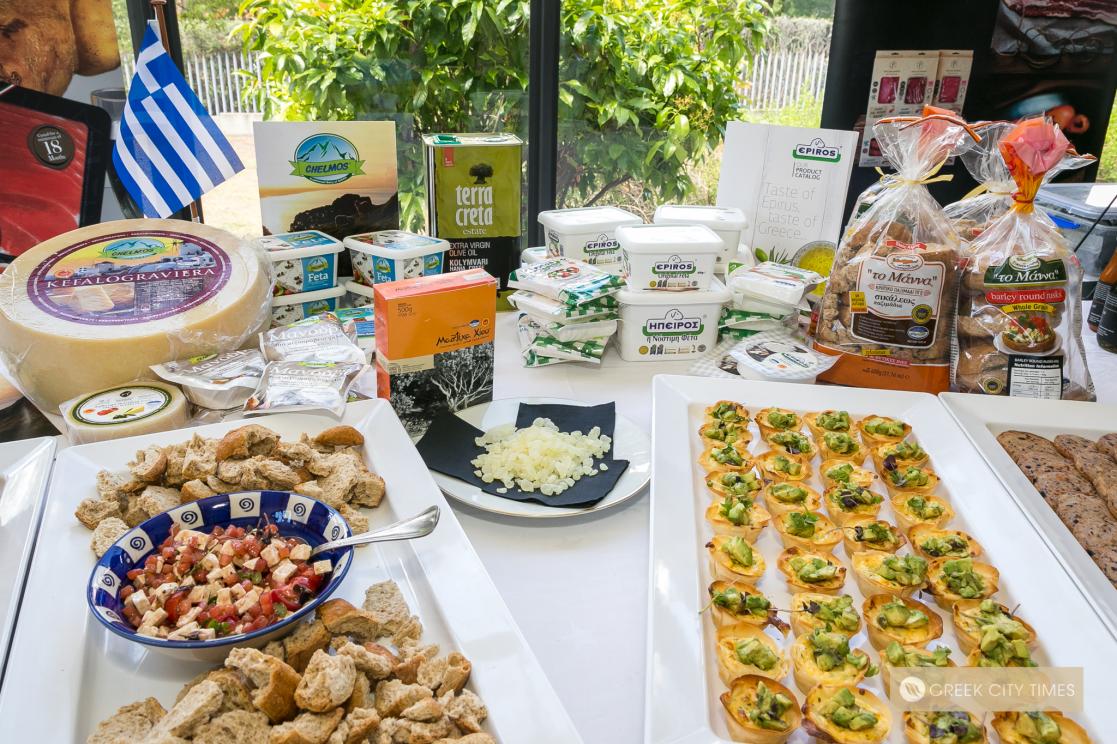Top EU & Australian chefs put Geographical Indications on the menu

The world-class chefs cooked up a storm at the 'Food for Serious Thought: Geographical Indications Day' at the Italian Embassy on November 24. The degustation followed a high-level panel discussion on geographical indications (GIs), a crucial part of the EU-Australia Free Trade Agreement negotiations.

Their menus featured world-famous Protected Georgraphical Indication (PGI) and Protected Deisignation of Origin (PDO) products from specific regions in Italy and Greece, including Prosciutto di Parma, Parmigiano Reggiano, Feta and Manouri cheese, Kolymvari Chanion olive oil and Krtiko Paximadi wheat rusks.

Alpha Restaurant Sydney Executive Chef Peter Conistis explained what made the products unique and how he likes to use them.
"I love the quality of the ingredients used and the way, for example, that the Greek Feta is produced. There is a great tradition in the production standards," the decorated chef told guests, including Ambassadors from Italy, Greece, Spain, high-level EU officials, Australian producers, academics, experts and stakeholders interested in the GI topic.
The guests had the chance to sample Spanish wines including Cava and Rioja and GI products from Germany, Belgium, Bulgaria, Hungary as well as a selection of high-uality Australian products from Bodalla Dairy, Piallago Estate Smokehouse, Capital Brewing Co., Stefano Lubiana Wines and Homeleigh Grove.
Food for Serious Thought
The event, organised by the EU Delegation to Australia and the Italian Embassy, followed the conclusion of the second round of the EU-Australia FTA talks in Canberra 19-23 November.
The EU is Australia's second-biggest trading partner and the FTA could see trade in goods increase by 37% and services by 8%, according to a European Commission impact assessment. According to the same model, if the EU concludes trade agreements with both Australia and New Zealand, it could add €4.9bn to the EU's GDP by 2030 and €4.2bn to Australia's economy. The first round of negotiations was held in Brussels, 2-6 July. Read more here.
The second round covered many topics including the EU's identification system for food products based on geographical origin.
Italian Ambassador to Australia Stefano Gatti said GI-products in Italy, of which there are 800+, are an important part of the economy. "Geographical indications allow niche producers to earn higher prices for their premium products. Italy, and the EU believe Australia's premium producers would significantly benefit from adopting geographical indications."

The EU's lead negotiator on GIs, Lionel Mesnildrey, says the certification is important for rural and regional economies. "They create value for local communities through products that are deeply rooted in tradition, culture and geography. They support rural development and promote new job opportunities in production, processing and other related services like agro-tourism."
"The European Union will be delivering on the expectations of Member States such as Italy for GIs to be a key part of the EU-Australia free trade agreement."
Mr Mesnildrey was joined in discussion with panellists John Power from the Australian Department of Agriculture and Water Resources, Dr Paula Zito from the University of Adelaide and Professor William van Caenegem from Bond University, who covered the EU system, the Australian GI approach to wine and the overall benefits to regional and rural communities.

Text: Susanna Dunkerley, EU Delegation to Australia. *Images Courtesy of Greek City Times. Nick Bourdo Photography (Copyright) Read the coverage from the Greek City Times here.
